July was a fascinating month for books, and online book launches.
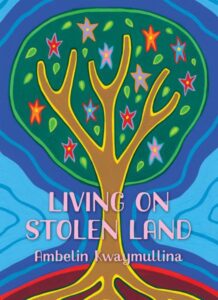 Living On Stolen Land (40 of 52) by Ambelin Kwaymullina is a short, powerful book that *everyone* should read (although sadly those who most need to hear these words of wisdom – including politicians, police and policy makers – will turn away again). It’s devastating and heartbreaking, yet uplifting, inspiring and full of hope too. And it leaves the ball firmly in the court of non-Indigenous people – to check our biases (explicit, structural and unconscious), to challenge our behaviours, to listen, really listen, and give space for Indigenous voices, and to work towards a decolonised future. Ambelin has also written several YA books, and written and/or illustrated some gorgeous kids books (she also painted this gorgeous cover)…🖤
Living On Stolen Land (40 of 52) by Ambelin Kwaymullina is a short, powerful book that *everyone* should read (although sadly those who most need to hear these words of wisdom – including politicians, police and policy makers – will turn away again). It’s devastating and heartbreaking, yet uplifting, inspiring and full of hope too. And it leaves the ball firmly in the court of non-Indigenous people – to check our biases (explicit, structural and unconscious), to challenge our behaviours, to listen, really listen, and give space for Indigenous voices, and to work towards a decolonised future. Ambelin has also written several YA books, and written and/or illustrated some gorgeous kids books (she also painted this gorgeous cover)…🖤
Ambelin was interviewed by Teela Reid from @blackfulla_bookclub for the book launch, a wonderful, confronting, inspiring conversation, which Gleebooks has posted on their YouTube channel – it’s definitely worth a listen…
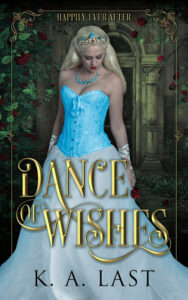 ❤️ Once I finished that, I was struggling to write, so I curled up with a cup of tea and read Dance of Wishes by K. A. Last (41 of 52), a sweet faery tale short story that’s part of the Princess Bachelorette boxset. It’s beautifully written, and has romance, true love, a king more concerned with the crown than his daughter, and a little magical spell to reveal the larger truth…
❤️ Once I finished that, I was struggling to write, so I curled up with a cup of tea and read Dance of Wishes by K. A. Last (41 of 52), a sweet faery tale short story that’s part of the Princess Bachelorette boxset. It’s beautifully written, and has romance, true love, a king more concerned with the crown than his daughter, and a little magical spell to reveal the larger truth…
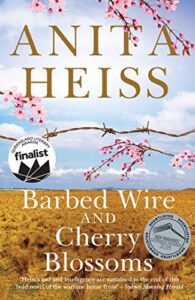
Barbed Wire and Cherry Blossoms (42 or 52), by wonderful author Anita Heiss, is a beautiful, touching novel, gorgeously written and meticulously researched. It begins during the Cowra breakout of August 1944, when more than a thousand Japanese WWII POWs broke out of the central NSW camp where they were being held, and is a fascinating (and devastatingly sad) snapshot of Australia at that time – a time of the White Australia policy, racial fear-mongering, and the absolutely heartbreaking way the government treated First Nations people (even worse than the way they treated the much-despised Japanese POWs, which is unforgiveable and so mind-bogglingly unjust).
But this book is far more than a historical retelling, it’s the story of one Japanese soldier, Hiroshi, the Aboriginal family who hide him for more than a year, and the love that grows between him and their daughter Mary. Despite so many fundamental differences, their relationship is full of tenderness and understanding, self-discovery as they each open the other’s mind to new beliefs and ways of seeing the world, and a shared connection to nature and the land of their birth that is so much a part of both of them. I am mortified by Australia’s terrible treatment of First Nations people 250 years ago, when the British colonised this land without treaty, and devastated that there is still terrible injustice today. In the acknowledgements, Anita writes: “I hope this book adds something to your own journey in life. I believe that understanding and appreciating who we are today requires us to understand and accept who and what we have been, collectively as a nation, in the past.” It has, and it does. I hope real change is close.
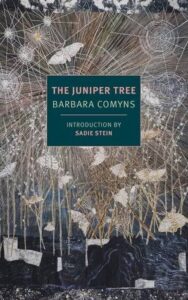
💛 I only started reading The Juniper Tree by Barbara Comyns (43 of 52) because we’re studying the Grimm Brothers story it’s based on, and I’m not sure I would have finished it otherwise. I didn’t love the characters or the writing style (there was far more telling than showing), it dragged in the middle, didn’t match its time period, and had some odd structural choices, but unlike some people, I liked the ending, and the subtle little seeds of the original faery tale sprinkled throughout were fun (definitely read the Grimm tale first, because it doesn’t work without it). Reviews are split between sheer brilliance and badly plotted and boring, so you might love it! (And weirdly, in retrospect I like it more than I thought I did while reading it, so…)
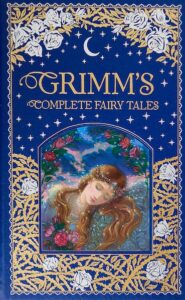 Next I read The Juniper Tree faery tale (44 of 52), including versions from The Brothers Grimm (who credited the source as artist and author Philipp Otto Runge), Angela Carter and Philip Pullman, as well as variants like The Rose Tree, The Crow’s Nest, The Little Boy and the Wicked Stepmother, and The Milk-White Dove, plus research into the type – how disturbing that there’s a faery tale classification for all the stories that fall under the My Mother Killed Me, My Father Ate Me trope (ATU 720) – and the ancient myths and tales that are echoed within the story, from Isis and Osiris to Medea, Tantalus, Philomela, Atreus and even Shakespeare’s Titus Andronicus, as well as the Christian allusions, and the shared motifs, including with Aschenputtel, the German Cinderella (not the eating, just the dead mother as tree spirit and gift giver aspect)…
Next I read The Juniper Tree faery tale (44 of 52), including versions from The Brothers Grimm (who credited the source as artist and author Philipp Otto Runge), Angela Carter and Philip Pullman, as well as variants like The Rose Tree, The Crow’s Nest, The Little Boy and the Wicked Stepmother, and The Milk-White Dove, plus research into the type – how disturbing that there’s a faery tale classification for all the stories that fall under the My Mother Killed Me, My Father Ate Me trope (ATU 720) – and the ancient myths and tales that are echoed within the story, from Isis and Osiris to Medea, Tantalus, Philomela, Atreus and even Shakespeare’s Titus Andronicus, as well as the Christian allusions, and the shared motifs, including with Aschenputtel, the German Cinderella (not the eating, just the dead mother as tree spirit and gift giver aspect)…
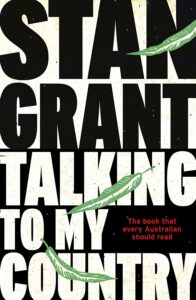 🖤 My last read for July was Stan Grant’s Talking To My Country, a personal meditation on what it means to be Australian, what it means to be Indigenous, and what racism really means in this country. It begins: “I want to tell you about the road that leads to my parents’s house. It was here my people were murdered.” and is a wonderful insight into this talented journalist’s life, history and beliefs.
🖤 My last read for July was Stan Grant’s Talking To My Country, a personal meditation on what it means to be Australian, what it means to be Indigenous, and what racism really means in this country. It begins: “I want to tell you about the road that leads to my parents’s house. It was here my people were murdered.” and is a wonderful insight into this talented journalist’s life, history and beliefs.
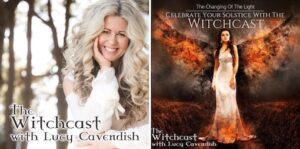
And instead of listening to audiobooks this month while I walked or drove, I listened to Lucy Cavendish’s wonderful weekly Witchcast, a bewitching podcast for Dreamers, Misfits, Seekers and Believers. It’s an intriguing blend of interviews with artists, singers, writers and other magical practitioners, plus witchy news, occult history, card readings, in-depth analysis of the real-life magic in popular supernatural movies and TV shows, both new and classic, and much more.
💕 📚 🌟
June Reads
June has been a strange, unsettling month, of high tension, of long overdue attention on black lives mattering, and of educating ourselves to learn more, do more and be better.
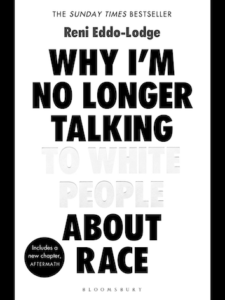
Award-winning journalist Reni Eddo-Lodge’s book Why I’m No Longer Talking To White People About Race (34 of 52) is a searing, illuminating, absolutely necessary examination of what it is to be a person of colour in Britain today, which is a powerfully moving read for people from other countries too. Exploring issues from eradicated black history to the inextricable link between class and race, the systemic racism that is so deeply entrenched in so many institutions, and the terrible way some white feminists treat black feminists (I was devastated to discover this), I definitely recommend it. It’s heartbreaking and devastating and uncomfortable to read, but it needs to be read, and heard, and then something needs to be done. I bought the audiobook, which is beautifully, passionately and clearly narrated by the author. The book grew out of a blog Reni wrote in 2014, called Why I’m No Longer Talking To White People About Race, about her frustration with the way discussions of race and racism in Britain were being led by those who weren’t affected by it. The post went viral, and she has, ironically, spent much of her time since having vital conversations with white people about race. The book won awards on its release in 2017, and last month it became the first book by a black British author to top the paperback non-fiction charts in the UK. The audiobook topped the Audible charts too. It’s awful that it took such tragedy and pain to get people to listen, but I’m glad we finally are. I listened to the audiobook, narrated by Reni, then bought the paperback too so I can refer back to various parts. (And I just saw that Reni also has a podcast, About Race with Reni Eddo-Lodge, which I’ll check out at some point…)
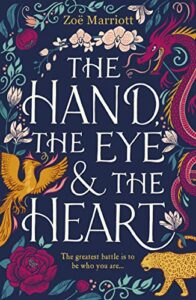
The Hand, The Eye & The Heart by Zoe Marriott (35 of 52) is a beautiful story of love, courage and discovering your true self. The characters are all richly drawn and complex, the plot is tightly woven with some great twists, and the gender fluidity of the MC is touchingly explored. I’m not the biggest fan of battles and training and warriors and warcraft, yet I was sucked in to the story and had to know what happened – there were a few very late nights staying up reading. It’s very loosely inspired by the Ballad of Mulan, but has little in common with Disney’s version – it’s its own story, with its own characters, situations and plot. Thank you @read3rz_revu for the gift! There has been some controversy over the English author setting the book in a fantasy world based on ancient China, and I admit this did make me feel a little uncomfortable about reading it, or sharing about it. I’m glad this is now a conversation and a consideration though, and it’s certainly something authors are discussing at great length. While writing, Zoe had several beta readers as well as sensitivity readers of Chinese and East Asian heritage, including a Chinese professor of English. And while she identifies as queer, she isn’t trans, so she had advice and support from several trans and non-binary people while she was writing, and once it was finished, had two trans sensitivity readers, including one of her closest friends. Knowledge and attitudes have shifted so much, and so quickly, in this area, which is a good thing. I’m not sure the vicious cancel culture of the YA community is the most positive way forward though, when an author who called out a fellow writer and got her book cancelled then had to pull his own for similar reasons, and when readers go around one-starring and commenting viciously about books they haven’t actually read. We are all learning and growing, and publishing is opening its doors to more writers, and people want to read more own-voices stories and experiences, which is all so wonderful. I hope the conversations will continue.
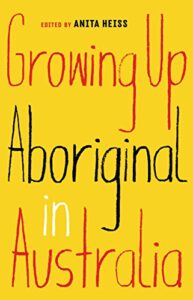 Growing Up Aboriginal In Australia (36 of 52), edited by wonderful author Anita Heiss, was awarded Small Publishers Adult Book of the Year at the ABIAs. It’s a heart-wrenching, sad, inspiring, awful, truthful, hopeful, eye-opening, educational and important anthology that showcases many diverse voices and experiences, and reveals the heartbreaking impacts of invasion and colonisation. Each piece speaks to the heart, calling for empathy, challenging stereotypes, and commanding respect, and sharing so many touching true stories about the lives of Aboriginal people in Australia today. Contributors include Tony Birch, Deborah Cheetham, Adam Goodes, Terri Janke, Patrick Johnson, Ambelin Kwaymullina, Jack Latimore, Celeste Liddle, Amy McQuire, Kerry Reed-Gilbert, Miranda Tapsell, Jared Thomas, Aileen Walsh, Alexis West, Tara June Winch, and many, many more. Dr Anita Heiss is the author of non-fiction, historical fiction, commercial women’s fiction, poetry, social commentary and travel articles, a Lifetime Ambassador of the Indigenous Literacy Foundation, and a proud member of the Wiradjuri nation of central NSW.
Growing Up Aboriginal In Australia (36 of 52), edited by wonderful author Anita Heiss, was awarded Small Publishers Adult Book of the Year at the ABIAs. It’s a heart-wrenching, sad, inspiring, awful, truthful, hopeful, eye-opening, educational and important anthology that showcases many diverse voices and experiences, and reveals the heartbreaking impacts of invasion and colonisation. Each piece speaks to the heart, calling for empathy, challenging stereotypes, and commanding respect, and sharing so many touching true stories about the lives of Aboriginal people in Australia today. Contributors include Tony Birch, Deborah Cheetham, Adam Goodes, Terri Janke, Patrick Johnson, Ambelin Kwaymullina, Jack Latimore, Celeste Liddle, Amy McQuire, Kerry Reed-Gilbert, Miranda Tapsell, Jared Thomas, Aileen Walsh, Alexis West, Tara June Winch, and many, many more. Dr Anita Heiss is the author of non-fiction, historical fiction, commercial women’s fiction, poetry, social commentary and travel articles, a Lifetime Ambassador of the Indigenous Literacy Foundation, and a proud member of the Wiradjuri nation of central NSW.
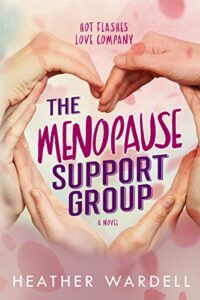 I don’t read a lot of women’s contemporary fiction, but I’ve been reading Canadian author Heather Wardell’s books since the first one came out in 2013 (Life, Love, and a Polar Bear Tattoo – which is free on all platforms), and have really enjoyed them all. One in particular I absolutely loved, and still think about (Planning To Live – although Heather told me this book is a love or hate one for her fans, which intrigues me). Her new book The Menopause Support Group (37 of 52) is a wonderful read – the characters are complex and real, all of them flawed and at times annoying, but as their pain and vulnerability is revealed, you can’t help but feel compassion for them and cheer them on as they learn more about themselves and each other. The friendships that develop are beautiful, and the support they give each other is really touching. It’s a wonderful read with lots of heart, the odd plot surprise, and a lovely message of love, friendship, support, second-chances, new dreams, and hope when you thought there would never be any again. And Heather’s newsletter is my favourite author one, with a free short story most months, pics of her adorable rescue cat, and a really engaging writing style and connection with her readers.
I don’t read a lot of women’s contemporary fiction, but I’ve been reading Canadian author Heather Wardell’s books since the first one came out in 2013 (Life, Love, and a Polar Bear Tattoo – which is free on all platforms), and have really enjoyed them all. One in particular I absolutely loved, and still think about (Planning To Live – although Heather told me this book is a love or hate one for her fans, which intrigues me). Her new book The Menopause Support Group (37 of 52) is a wonderful read – the characters are complex and real, all of them flawed and at times annoying, but as their pain and vulnerability is revealed, you can’t help but feel compassion for them and cheer them on as they learn more about themselves and each other. The friendships that develop are beautiful, and the support they give each other is really touching. It’s a wonderful read with lots of heart, the odd plot surprise, and a lovely message of love, friendship, support, second-chances, new dreams, and hope when you thought there would never be any again. And Heather’s newsletter is my favourite author one, with a free short story most months, pics of her adorable rescue cat, and a really engaging writing style and connection with her readers.
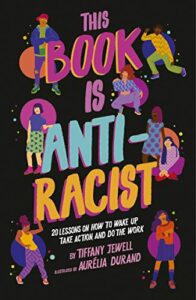
This Book Is Anti-Racist: 20 Lessons on How to Wake Up, Take Action, and Do the Work by Tiffany Jewell, illustrated by Aurelia Durand (38 of 52), is definitely worth reading. I opened it to find a line to post for an Instagram challenge – and ended up reading half the book immediately. This line really touched me: “You are made up of all the stories you cannot wait to share, and those you don’t want to tell, and everything in between…” Although it was written for young people facing racism, it’s an important read for ALL people, simplifying complex issues and offering exercises to get you thinking about your own understanding, your own biases, your own privilege, and what you can do to help. It’s no longer enough to not be racist, we have to be anti-racist…
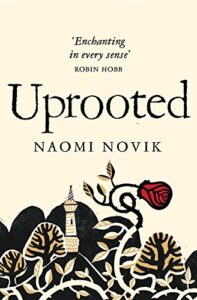
How could I not love a book about witches and wizards, kings and queens, evil forests and enchanted trees, that’s inspired by folk and faery tales, and has two awesome feisty young women at the centre? Uprooted by Naomi Novik (39 of 52) was a lovely read, despite me not especially caring about war and battle strategies, and I loved the way Agnieszka’s character and magic developed over the course of the story, and how connected she was to nature and the trees and the earth. It’s long, and a little grim (what faery tale isn’t!?), but beautifully written, and now I guess I should try to find where I put my copy of Naomi’s book Spinning Silver. (I have so many boxes of books to read, I really need to stop buying new ones and read what I have – but there are so many amazing new ones I just have to have too! My willpower is non-existent when it comes to books, but I guess it’s not the worse vice I could have!)
“The magic in Uprooted, with its realistic moral dimension, is so vividly believable that it almost seems you could work the spells. But the book will do that for you.” Ursula K. Le Guin
“Uprooted by Naomi Novik is enchanting, in every sense of that fine old word. A charming and inviting story that looks unflinchingly at the strangling roots of hurt and revenge.” Robin Hobb
Read about the eight books I read in May here.
Read about the twelve books I read in April here.
Read about the four books I read in March here.
Read about the four books I read in February here.
Read about the six books I read in January here.
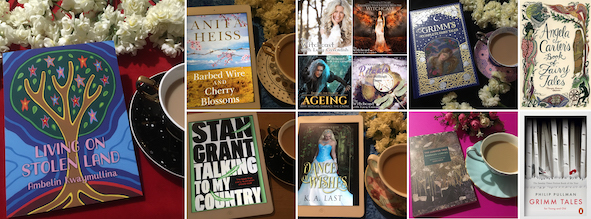
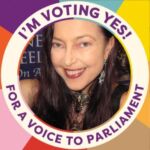

Get Social